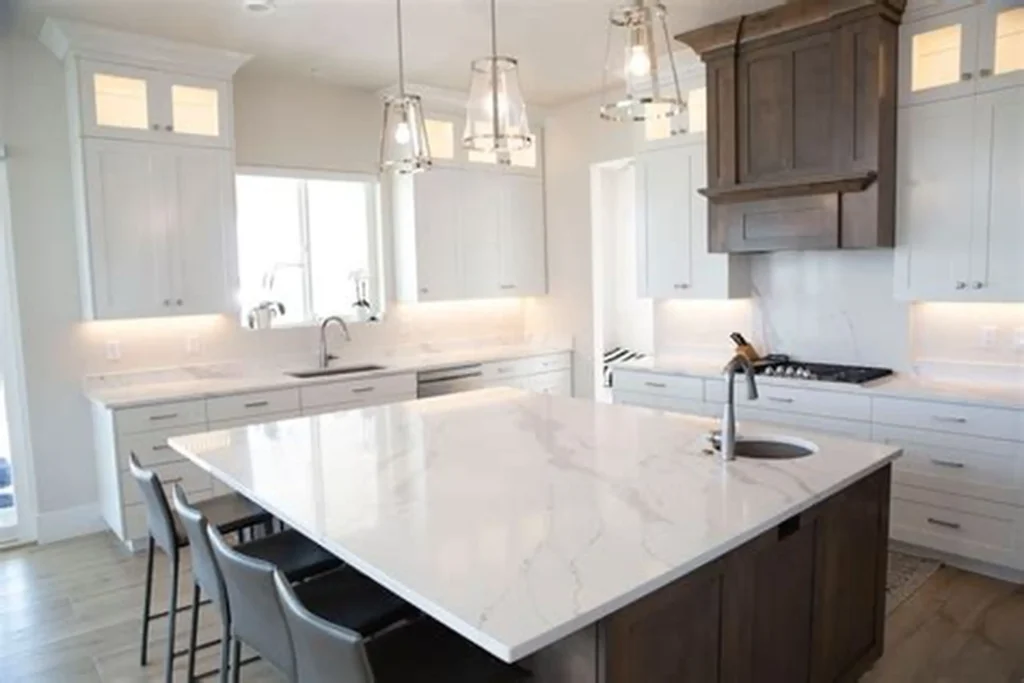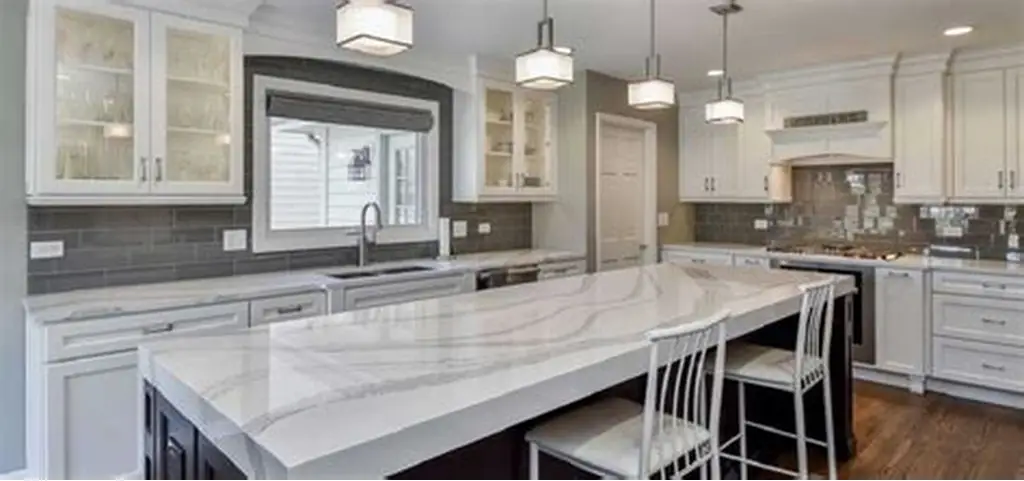Quartz countertops are one of the most sought-after surfaces for modern kitchens and bathrooms. They are durable, non-porous, and available in countless styles—from white quartz countertops and Calacatta quartz countertops to marble look quartz countertops and veined quartz countertops. But with all the benefits quartz offers, proper care remains essential for preserving its beauty over time. One frequently asked question is: Can you use vinegar on quartz countertops?
In this article, we’ll explore whether vinegar is safe for quartz, when it might be useful, when to avoid it, and what alternatives to use for daily cleaning and maintenance.

What Are Quartz Countertops?
Quartz countertops are engineered stone countertops made from roughly 90–95% natural quartz combined with polymer resins and pigments. This process results in quartz slabs for countertops that are:
- Non-porous
- Stain and scratch resistant
- Hygienic and low maintenance
Unlike granite or marble, quartz does not require sealing, making it an excellent option for low maintenance quartz countertops for busy families.
👉 Learn more: What Are Quartz Countertops?

Can You Use Vinegar on Quartz Countertops?
The Short Answer: Occasionally, With Caution
While white vinegar is often touted as a miracle cleaner, it’s not ideal for regular use on quartz countertops. The acidity in vinegar (pH around 2–3) can gradually wear down the resin binders on the surface, leading to:
- Dulling of the finish
- Loss of shine
- Potential surface etching
That said, diluted vinegar can be used occasionally for specific tasks—like removing hard water stains or mineral deposits—provided it’s rinsed thoroughly afterward.
Why Vinegar Isn’t Recommended for Daily Quartz Cleaning
Despite its natural and eco-friendly appeal, vinegar is:
- Acidic: Over time, it breaks down the polymers in quartz surfaces.
- Unnecessary: Mild dish soap and warm water are more than enough for regular maintenance.
- Potentially damaging: Especially on white quartz countertops and polished surfaces that highlight etching or cloudiness.
👉 Read more: What Not to Use on Quartz Countertops?
When Is It Safe to Use Vinegar on Quartz Countertops?
For Hard Water Stains and Mineral Deposits
Quartz around sinks or faucets—especially in quartz bathroom countertops—can develop chalky white spots due to hard water.
Safe vinegar method:
- Mix equal parts vinegar and water in a spray bottle.
- Spray the stained area.
- Let it sit for 3–5 minutes.
- Wipe with a soft cloth.
- Rinse with warm water.
- Dry thoroughly.
This technique should be used sparingly, not as a daily cleaner.
👉 Learn more: Do Quartz Countertops Stain?
Safer Alternatives to Vinegar for Quartz Cleaning
1. Mild Dish Soap + Water
The gold standard for daily quartz care.
- Mix a few drops of dish soap with warm water.
- Wipe with a microfiber cloth or non-abrasive sponge.
- Rinse and dry.
2. Quartz-Safe Cleaners
Look for cleaners labeled as safe for quartz or natural stone. Examples include:
- Weiman Quartz Cleaner
- Granite Gold Quartz Brite
- Method Daily Granite Cleaner
These are pH-balanced and designed for engineered stone countertops.
How to Deal with Tough Stains on Quartz
For oil, ink, or pigmented stains:
- Use a baking soda paste (baking soda + water).
- Try isopropyl alcohol (70%) on ink or makeup stains.
- Use a plastic scraper (not metal) for hardened debris.
👉 Related:
How to Remove Water Stains from Quartz Countertops
Hard Water Stains on Quartz Countertops?
How to Maintain Quartz Countertops Without Vinegar
Do:
- Clean spills immediately
- Use trivets for hot pans
- Use cutting boards to prevent surface scratches
- Dry surfaces after cleaning
Don’t:
- Use vinegar daily
- Use bleach or ammonia
- Scrub with steel wool or abrasive pads
- Place hot cookware directly on the countertop
For maintenance tips on granite, check out:
👉 How to Maintain and Care for Granite Countertops
Quartz Countertops: Pros and Cons
Pros:
- No sealing required
- Highly durable and scratch-resistant
- Stain-resistant
- Huge variety of styles like Calacatta, marble look, grey, and black quartz countertops
- Easy to clean
Cons:
- Sensitive to heat
- Can be damaged by acidic cleaners like vinegar
- Not suitable for outdoor use
Quartz vs Granite Countertops
| Feature | Quartz | Granite |
|---|---|---|
| Sealing Required | ❌ No | ✅ Yes |
| Porosity | Non-porous | Porous |
| Daily Cleaning Needs | Low | Medium |
| Vinegar Use | Limited use only | ✔️ Often safe with care |
| Appearance | Consistent patterns | Natural variations |
👉 Learn more:
How to Restore or Bring Back the Shine to Granite Countertops?
Quartz Countertop Installation Cost
Here’s a general breakdown:
| Quartz Grade | Installed Price per Sq. Ft. |
|---|---|
| Budget quartz countertops | $50–$70 |
| Mid-range quartz slabs | $70–$100 |
| Premium quartz (e.g., Calacatta) | $100–$150+ |
Where to Buy and Install Quartz Countertops
Looking for options? Start here:
- Quartz countertop showrooms
- Local quartz countertop suppliers
- Custom quartz countertop installers
For DIY enthusiasts, explore: DIY quartz countertop installation tips
Also search:
- Quartz countertops near me
- Quartz countertops in [your city or region]
- Gantry crane
Final Thoughts
So, can you use vinegar on quartz countertops? The answer is yes—but sparingly and with care. While vinegar is great for tackling hard water stains, it shouldn’t be your go-to cleaner for everyday use. Over time, frequent exposure to acidic substances like vinegar can dull the surface and degrade the resin binders in quartz.
For the best results, stick to mild dish soap, water, and quartz-safe cleaners. That way, whether you’ve chosen white quartz countertops for your kitchen or veined quartz countertops for your bathroom, your surfaces will stay shiny, elegant, and stain-free for years to come.
Keep your countertops happy—ditch the vinegar for daily care and enjoy the lasting beauty of quartz.

